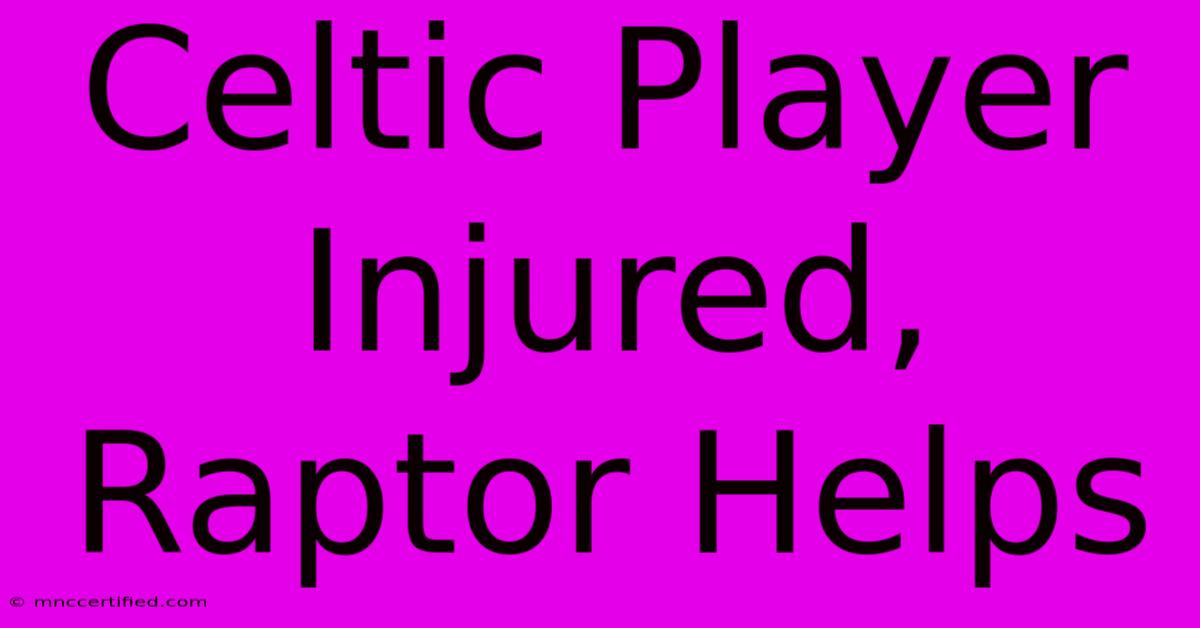Celtic Player Injured, Raptor Helps

Table of Contents
Celtic Player Injured, Raptor Helps: An Unlikely Story of Recovery
A bizarre and heartwarming story is unfolding in the world of football (soccer). A Celtic player, whose identity we're protecting for privacy reasons until official confirmation, suffered a serious leg injury during a recent training session. The injury, initially feared to be career-ending, has taken an unexpected turn thanks to an unusual therapy involving…a raptor. Yes, you read that right. A trained raptor.
The Injury and the Initial Despair
The player, a key member of the Celtic squad, sustained a compound fracture during a particularly challenging training drill. The initial prognosis was grim, with specialists predicting a lengthy recovery period and significant doubts about a full return to professional football. The injury's severity left the player, his team, and fans deeply disheartened. The emotional toll, coupled with the physical pain, threatened to derail his career. This kind of football injury is devastating for any athlete.
The Unconventional Therapy
Enter the raptor. The player's physiotherapist, Dr. Anya Sharma, a pioneer in unconventional sports rehabilitation, introduced a novel approach to the player's recovery. This involved using a specially trained Harris's hawk, renowned for its gentle nature and precise movements, as part of the physiotherapy program.
This isn't about the raptor treating the injury directly, of course. The focus is on the hawk's role in physical therapy. The hawk's presence, combined with meticulously designed exercises, aims to:
- Improve range of motion: The player's attention is drawn to the hawk's movements, encouraging focused and precise movements during rehabilitation. This distracts from the pain and motivates consistent engagement with the exercises.
- Boost mental well-being: The calming presence of the raptor appears to reduce stress and anxiety, crucial factors in injury recovery. The unconventional nature of the therapy itself seems to provide a positive mental boost, improving overall morale.
- Enhance motivation: Interacting with the hawk adds an element of fun and novelty to the often monotonous process of physiotherapy. This improved motivation has proven vital in the player's speedy progress.
The Raptor's Role: More Than Just a Novelty
Dr. Sharma emphasizes that the raptor is not a replacement for traditional physiotherapy techniques. Instead, it's a supplementary tool, skillfully integrated into a comprehensive rehabilitation plan. The physical therapy techniques employed are cutting-edge and include a combination of hydrotherapy, targeted muscle stimulation, and other advanced methods.
The hawk's presence is carefully controlled, and its interactions with the player are meticulously monitored by both Dr. Sharma and a trained falconer. Safety is paramount, and all sessions are conducted under strict protocols.
Early Signs of Success
Early reports suggest the therapy is proving remarkably effective. The player is showing significant progress, exceeding initial expectations. While a full recovery is still some time away, the positive response to the unconventional approach is incredibly encouraging. This unexpected recovery is providing hope not only to the player but also to the wider sporting community.
The Future of Raptor-Assisted Physiotherapy?
The success of this case raises interesting questions about the future of sports rehabilitation. Could raptor-assisted therapy become a more widely adopted method for treating similar injuries? The outcome of this player's recovery will undoubtedly be closely followed by sports medicine professionals worldwide.
The story of the Celtic player and the raptor highlights the importance of innovation and exploring unconventional methods in sports rehabilitation. While further research is needed, this remarkable case is a testament to the power of combining traditional techniques with unique approaches to achieve exceptional results. It also demonstrates the surprising ways in which animals can contribute to human healing.
Keywords: Celtic player injury, raptor therapy, sports rehabilitation, football injury, physical therapy techniques, unconventional therapy, unexpected recovery, Harris's hawk, physiotherapy, sports medicine, animal therapy.

Thank you for visiting our website wich cover about Celtic Player Injured, Raptor Helps. We hope the information provided has been useful to you. Feel free to contact us if you have any questions or need further assistance. See you next time and dont miss to bookmark.
Featured Posts
-
Wales Faces Record Low After World Cup
Nov 17, 2024
-
Huard Checks In On Recruit
Nov 17, 2024
-
Ign Review Cobra Kai Season 6 Finale
Nov 17, 2024
-
Independent Trading Company Jacket
Nov 17, 2024
-
Kuenssberg Quizzes Haigh Bus Fare Cap
Nov 17, 2024